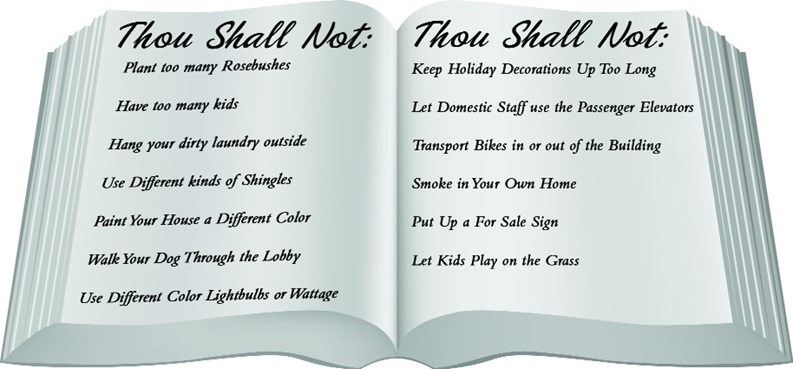Condos and homeowner associations have made headlines over the years for passing all kinds of overreaching and downright silly rules and regulations—everything from forbidding the flying of the American flag to having prohibitions about hanging laundry outdoors, to discriminating against their own residents—even stopping kids from playing ball or riding their bikes in their own yards. It might sound like something out of a political satire, or items from a humorous 'News of the Weird' newspaper column, but these stories of some boards going too far are true, and we've collected some of the silliest, most unusual or most outrageous HOA rules ever passed.
The Ugly Truth
Did you hear the one about the Florida family that was about to be kicked out of their HOA because the wife had just had twins? The family already had one child, and the arrival of the twins would put them over the two-kids-per-unit allowed by their North Palm Beach condo. The condo was not an 'active adult' 55-and-over community, but nevertheless it had a rule on the books limiting occupancy to two children. A bit Machiavellian to be sure, but true.
Or how about the Fort Myers condo that fined a man suffering from ALS $100 a day because he was using a shopping cart instead of a walker to get around his unit, the parking area and the grounds? Apparently the community had a rule forbidding the use of any 'storage item' in a common area like a walkway.
Another Sunshine State condo passed a rule preventing two unmarried people from living together, aimed at stopping gay couples from living in the development. After an uproar about the ban, the rule was reversed earlier this year.
Or take the case of a Long Beach, California woman who needed to use a cane, and kept a cocker spaniel as a companion animal. Her HOA banned her from walking the dog through the lobby, because they had a rule that all pets had to be CARRIED so their little paws wouldn’t touch the floor. (Good thing she didn’t have an English sheepdog.) She was fined $25 a day and racked up hundreds of dollars in fines before she finally gave up and moved from the building.
It’s Perfectly Legal …
Yes, a co-op, condo or HOA board is legally allowed to administer their own rules and regulations—all for the unique privilege to live in such a community. Under the business judgment rule, courts have given boards of directors wide discretion in passing rules that they feel are in the best interest of everyone in the community—as long as it’s done in good faith.
Many HOAs routinely have a list of approved exterior paint colors: they can tell you what color to paint your fence or your deck, what type of plants or landscaping you can have, what type of trees and shrubs are permissible. They can limit commercial vehicles parked in your own driveway, or require that cars and other machinery not be visible from the street if it’s an eyesore. They can restrict certain types of signage, even real estate signs.
What’s a Well-Meaning Board to Do?
Experts are pretty much in agreement that the best advice before taking any action to pass a new rule is to consult your legal team to make sure it's enforceable and unlikely to result in litigation. Also remember that many rules—no matter how outlandish they may sound—may indeed be warranted and have a purpose in addressing an issue the co-op, condo or HOA is facing.
“The single best thing board members can do is to speak with their association attorney first before spending time drafting or adopting rules,” advises Donna DiMaggio Berger, a shareholder attorney with the law firm of Becker & Poliakoff in Fort Lauderdale. “It is important to understand that certain restrictions simply cannot be passed by board rule alone. Other times, there is a provision in the governing documents which requires membership approval for some or all board rules,” she says.
Many condos/HOAs around the country have in their governing documents provisions requiring anywhere from a simple majority to 75 percent approval before any bylaws, rules, or house rule provisions can be amended.
Berger also states that you should do your due diligence in researching the issue to make sure the rule you’re passing is warranted and does not cause any problems down the road. “Boards should spend 95% of their time identifying the problem and 5% crafting the solution via rule. Unfortunately, most approach the issue in the reverse order,” Berger says.
Bad Moon Rising
In counseling hundreds of condominium, cooperative, timeshare, mobile home and homeowner associations throughout Florida since 1992, Berger has seen her share of unusual rules. Here’s one that she particularly remembers. “One of the craziest rules I ever came across was one which made me wonder what prompted its passage in the first place. It was a rule in a rather placid HOA which prohibited nudity in their common areas.”
It’s not surprising that many of the more controversial rules emanate from Florida associations. When asked about that, Berger says that it is due to the Sunshine State’s large number of community associations and HOAs. The problem, however, exists, no matter what region of the country or municipality you are located in, she notes.
Board members need to understand what being on the board means, and how to avoid overstepping their bounds. Sometimes, a board comprised of seemingly level-headed people can jump the tracks and head off in a direction that is neither productive nor healthy for their association. “It’s important that each member of the board remain cognizant of why they’re on the board in the first place. Hopefully, they got involved in order to make a contribution to the community and insure that it remain a community that people rave about. When it comes to creating and enforcing rules, moderation has to be the key, and the purpose should always be to correct a problem and improve the community as a whole,” says Chuck Graziano, CPM, PCAM, who is the North Jersey Regional Director for Associa’s Mamco Property Management, and a management consultant.
“For example, a community association might have a rule that prohibits any decorations on the outside of the units. A board should consider if this is the ‘personality’ that they’d like their community to reflect, or is it more practical to define reasonable limits and time frames for such things as holiday decorating and planting of annual flowers,” he says.
Technically, flying a veteran’s POW/MIA flag discreetly on a pole by the mailbox may or may not be a violation of the rule. So, too, might be hanging a holiday wreath on the door in December. But is it in the best interests of the association to crack down on patriotism and non-sectarian holiday spirit?
“Boards need to be reasonable in their deliberations and avoid adopting rules with a ‘grey area’,” Graziano says. “Enforcing well crafted, reasonable rules is at times difficult enough for the board. Creating overly restrictive or unclear rules or rules that pertain to a single situation or homeowner will only make for a far more difficult job.”
It’s essential that anyone who is elected to their board read their community’s rules and bylaws and understand what they can and cannot do as a board member. In the case of a new board member, veteran board members can often give advice and guidance.
In New Jersey, Graziano notes, the business judgment rule applies in certain situations.
“Most states provide a great deal of latitude for community association boards to manage their affairs through the business judgment rule. In New Jersey, for example, the business judgment rule requires evidence of fraud or lack of good faith on the board’s part in order for the courts to get involved. Contemporary boards tend to maintain rules that are not overly restrictive and allow for a degree of independence and self-expression (e.g., allowing for a degree of exterior plantings and decorating). What remains critically important,” he says, “is that there be clarity in the way these rules are worded and that enforcement be uniform and consistent. Interpretations or uneven enforcement along the way may well lead to a claim of bad faith, while consistency will insure that the original intent of the rule is protected.”
Attorney Steven Goldman, a partner with the Manhattan-based law firm of Kurzman Eisenberg Corbin & Lever, LLP, says that what some might consider an unreasonable rule might have reasonable intent behind it. “Sometimes they really do have a purpose and it’s just a matter of understanding. It doesn’t mean whether it’s a co-op board or condo board, that they’re done it perfectly but you got to look at what were they trying to achieve and how did they go about it.”
Some instances might be warranted. Take carrying a pet through the lobby. A co-op or condo board might have just spent $600,000 on redoing the lobby, putting in carpeting and other improvements—therefore the rule might have merit, he says. The board may require taking the pet through the basement or the back entrance instead of the lobby, and that is not all that crazy.
“It’s two-fold, number one there’s a lot of traffic in the lobby and you never know how a pet’s going to react, and but more so they don’t want the pet to relieve itself,” Goldman says. “It may seem silly but there is some intent.”
Same thing with elevators, you cannot bring a pet in through the elevator. If you live on the 20th floor, that might seem rash. If you’re allowed to use an elevator, though, you might have rules about requiring the pet to be leashed, prohibition against more than one pet or rules against barking and biting. They’re trying to control behavior, Goldman says. “Again it makes sense.”
War of the Roses
Here are some more actual condo/HOA rules from around the country:
An HOA in Texas has two garage sales a year, and they’ve passed a dress code for certain neighborhood activities. So at garage sales, community gatherings, swim parties, etc., residents and guests have to be attired appropriately. For garage sales, they must wear polos and khakis (with a $30 fine for non-compliance); members cannot share towels at the swimming pool, even if you bring your own for your family ($25 fine); you must remove holiday decorations within three days of the end of the holiday ($50 fine); and, you cannot use a different color light bulb unless approved by the HOA ($25 fine).
A Rancho Sante Fe, California man was hit with a lawsuit by his condominium because he exceeded the number of rose bushes he was allowed to plant on his four-acre property. The HOA levied multiple fines, took the resident to court and ultimately won. The man had to pay the HOA’s $70,000 legal bill, and lost his home to the bank in a foreclosure action.
A sad story is that of a Sanford, Florida homeowner who lost his wife and infant son when a plane crashed into their home. The HOA fined him during the reconstruction for using shingles that didn’t perfectly match that of his neighbor’s homes.
A New York City condo in the hip SoHo neighborhood that caters to artists and creative types wanted to be sure that their residents were sufficiently talented before being allowed to buy into the building. It was their policy to screen who was living there—by vetting and approving—the quality of their creative work in a twist on the juried MFA exhibit.
Goldman, though, who’s been representing co-ops and condos for 40 years, says that he’s not come across anything he would consider wild or crazy. But he always tells boards to seek legal or management advice. “I would say you have two great resources available to you, one is the managing agent and the other is your attorney. Talk to them. They might not have the answer in all cases but many, many different co-op and condominium boards have come across many different problems and during the discussion new ideas may come up on how to deal with the problem.”
Consider Mediation and Enforcement
Little things can escalate, as any attorney will tell you. Before making matters worse and having your community’s dirty laundry hung out to dry in the local and national news, community association and HOA boards should try and defuse a headline-grabbing news story before it becomes news. Seeking mediation, imposing reasonable fines, and compromising with the parties involved are all avenues to consider, the experts say.
Rules should be fair and fairly applied, be reasonable, and give the violator a chance to be heard, says Berger. Goldman says to always remember to reach out to the violators. Besides sending a letter, have the manager talk to the person and explain the intent of the rule, whether it concerns noise, pets, maintaining the terrace or the common areas, whatever. Then if you don’t get a corrective action, then you put the violator or the homeowner on notice, Goldman says. Fines should be a last resort, he adds.
Don’t be swayed by any threats or show favoritism to one homeowner or shareholder over another. Boards have a fiduciary duty to act in the best interests of the co-op, condo or homeowners association that they represent.
“Don’t forget it’s a community,” relates Goldman, “and as such, you’re really trying to maintain a level of appearance, a level of aesthetics. The best way to describe it is that people live in a suburban development and people on either side have gorgeous lawns and one in the middle has weeds all over the place. No matter what, that affects the value of the properties going on next door.”
Berger puts it quite succinctly. “One of the main reasons most purchasers buy in a private residential community governed by a mandatory association is that they expect the covenants and restrictions to be enforced much more quickly and consistently than would happen in a neighborhood subject only to county and city codes and ordinances,” says Berger. “There is a general expectation in private communities that one will not find unkempt lawns, cars on cement blocks, high crime rates and a myriad of other negative factors that can be controlled by reasonable rules, which are properly enforced.”
Debra A. Estock is managing editor of The New Jersey Cooperator.







Comments
Leave a Comment